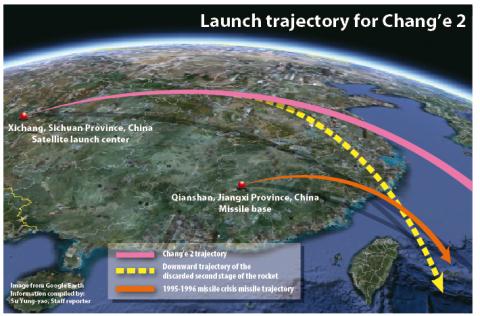Minister of National Defense Kao Hua-chu (高華柱) yesterday assured lawmakers across party lines that the military would be able to track Chinese missiles or satellite rockets in motion after the nation’s NT$30 billion (US$967.4 million) long-range early warning radar system is completed.
Kao made the remarks in response to questioning from Chinese Nationalist Party (KMT) Legislator Liao Wan-ju (廖婉汝) on whether the Ministry of National Defense (MND) has the capability to monitor the trajectory of China’s missiles or satellite rockets.
Liao, head of the legislature’s Foreign and National Defense Committee, raised her concerns after the Chinese-language Liberty Times (the Taipei Times’ sister paper) yesterday quoted National Space Organization Systems Engineering Director Chen Yen-sen (陳彥升) as saying that a fireball in the sky over eastern Taiwan about 7pm on Oct. 1 was the discarded second-stage rocket of China’s Chang’e 2 satellite.

Chen was quoted as saying that the trajectory of the rocket was similar to that of China’s missiles falling off the east coast during the Taiwan Strait Crisis between July 1995 and March 1996.
Kao said the rocket and the missiles had different heights and trajectories, adding that the National Science Council had dismissed Chen’s speculation as his personal opinion rather than an official statement by the council.
In another question-and-answer session, Democratic Progressive Party (DPP) Legislator Lee Chun-yee (李俊毅) also grilled defense officials over the matter.
Lee accused the ministry of refusing to make public that a Chinese rocket flew dangerously close to a location where China once lobbed rockets near Taiwan.
Lee pressed Kao by questioning whether the ministry had protested to Beijing for allowing the rocket to fly over Taiwanese airspace.
“If not, does this mean that Taiwan’s satellites or missile tests can fly over China’s airspace?” Lee asked.
Kao did not answer, but told Lee that he would tell him in private after the open session.
Kao’s response, however, prompted further criticism from Lee, who called the defense minister “irresponsible.”
At a separate setting, ministry officials said that given that the trajectory of China’s satellite Chang’e 2 was hundreds of kilometers above the earth, it generally does not consider it an intrusion of airspace.
The ministry said it therefore dismissed the launch of Chang’e 2 as a concern for Taiwan’s national security or as an intrusion of the nation’s airspace.
ADDITIONAL REPORTING BY HSU SHAO-HSUAN AND VINCENT Y. CHAO

AGING: As of last month, people aged 65 or older accounted for 20.06 percent of the total population and the number of couples who got married fell by 18,685 from 2024 Taiwan has surpassed South Korea as the country least willing to have children, with an annual crude birthrate of 4.62 per 1,000 people, Ministry of the Interior data showed yesterday. The nation was previously ranked the second-lowest country in terms of total fertility rate, or the average number of children a woman has in her lifetime. However, South Korea’s fertility rate began to recover from 2023, with total fertility rate rising from 0.72 and estimated to reach 0.82 to 0.85 by last year, and the crude birthrate projected at 6.7 per 1,000 people. Japan’s crude birthrate was projected to fall below six,

US President Donald Trump in an interview with the New York Times published on Thursday said that “it’s up to” Chinese President Xi Jinping (習近平) what China does on Taiwan, but that he would be “very unhappy” with a change in the “status quo.” “He [Xi] considers it to be a part of China, and that’s up to him what he’s going to be doing, but I’ve expressed to him that I would be very unhappy if he did that, and I don’t think he’ll do that. I hope he doesn’t do that,” Trump said. Trump made the comments in the context

SELF-DEFENSE: Tokyo has accelerated its spending goal and its defense minister said the nation needs to discuss whether it should develop nuclear-powered submarines China is ramping up objections to what it sees as Japan’s desire to acquire nuclear weapons, despite Tokyo’s longstanding renunciation of such arms, deepening another fissure in the two neighbors’ increasingly tense ties. In what appears to be a concerted effort, China’s foreign and defense ministries issued statements on Thursday condemning alleged remilitarism efforts by Tokyo. The remarks came as two of the country’s top think tanks jointly issued a 29-page report framing actions by “right-wing forces” in Japan as posing a “serious threat” to world peace. While that report did not define “right-wing forces,” the Chinese Ministry of Foreign Affairs was

PREPAREDNESS: Given the difficulty of importing ammunition during wartime, the Ministry of National Defense said it would prioritize ‘coproduction’ partnerships A newly formed unit of the Marine Corps tasked with land-based security operations has recently replaced its aging, domestically produced rifles with more advanced, US-made M4A1 rifles, a source said yesterday. The unnamed source familiar with the matter said the First Security Battalion of the Marine Corps’ Air Defense and Base Guard Group has replaced its older T65K2 rifles, which have been in service since the late 1980s, with the newly received M4A1s. The source did not say exactly when the upgrade took place or how many M4A1s were issued to the battalion. The confirmation came after Chinese-language media reported